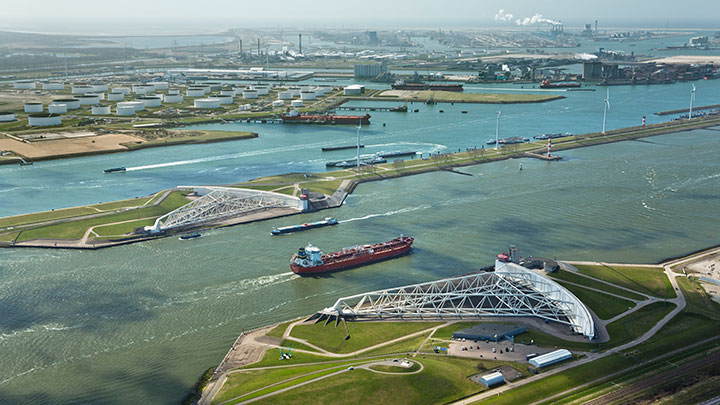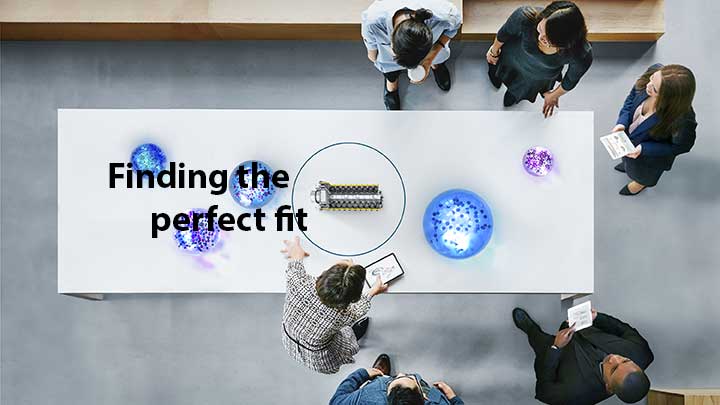Powering sustainable shipping
The global shipping industry is working towards a sustainable future. This means that you will face important choices about the technologies and investments you need in order to stay competitive and at the forefront of compliance for decades to come.
At MAN Energy Solutions, we are helping to shape the sustainability agenda and provide a clear path for you to achieve your goals. As the industry’s trusted partner for class-leading marine systems, we have the expertise and solutions ready
now to support whatever decisions you make.
Introduction to future fuels
Reduction of greenhouse gas emissions in maritime shipping to meet the 2050 targets requires all parties involved and stakeholders to take action.
No matter what vessel you operate, our proven, fuel-flexible engines and propulsion systems enable you to safeguard your future fuel strategy and allow you to take advantage of favorable market conditions. We can also support you with a complete portfolio of retrofit solutions, upgrades, and services, designed to optimize returns from your existing investments.

Future fuels survey 2022 - results
At the end of 2022 we asked our four-stroke customers to participate in our short survey about Future fuels in the maritime shipping industry. Out of all replies, we have extracted and summarized the most relevant results and are happy to share them now with you.
When do you expect the following fuels and engine attributes to be relevant in your application?
In the short and mid term, biofuels and methanol are expected to take the lead and be most relevant for four-stroke applications in the upcoming years, in parallel to a continuously relevant share of LNG driven vessels.
Mid to long term, additional fuels, such as NH3 ready or even H2 may gain relevance.
Future fuels for the maritime industry – Download our new white papers
The shipping industry must halve its GHG emissions by 2050. There are many future fuels to choose from. But which one is right for you?
Learn more about future fuels for the marine industry in our white papers.
Read more about the different future fuel types and discover our extensive portfolio of products, solutions, and services.
Get in touch with our experts
Would you like to learn more about future fuels and which technologies, solutions, and products best meet your needs?
Our global network of dedicated engineers is happy to point out the perfect-fit solution for you and your business. Start your engines now and reach out to us today.

Explore your fuel options
We can now offer multiple options for full fuel flexibility, engine-integrated emission reduction technologies and digital & data-supported operation.
Check out our configurator for two- and four-stroke engines, and find out more.
Related news
ME-GI to Power Ultra-Large Hapag-Lloyd Containerships
MAN Energy Solutions has won an order for 6 × MAN B&W 11G95ME-GI Mk10.5 main engines in connection with the building of 6 × ultra-large, 23,500+-teu container vessels for Hapag-Lloyd, one of the world’s leading liner-shipping companies.
The engines will be built in Korea and will offer the option of operating on LNG or conventional fuel, meeting Tier III emission standards through SCR (Selective Catalytic Reduction). The first engine delivery is scheduled for May 2022. Korean shipyard, Daewoo Shipbuilding & Marine Engineering, will build the vessels with delivery expected from April through December 2023.
In the company’s own press release, Rolf Habben Jansen, CEO of Hapag-Lloyd said: “With the investment in six ultra large container vessels we will not only be able to reduce slot costs and improve our competitiveness on the Europe – Far East trade, but also take a significant step forward in modernizing our fleet. Additionally we will further reduce our environmental impact.”
The newbuildings will be deployed on the Europe – Far East routes as part of THE Alliance and will significantly increase Hapag-Lloyd´s competitiveness in this trade. The engines will operate on LNG, but have sufficient tank capacity to operate alternatively on conventional fuel.
Bjarne Foldager, Senior Vice President and Head of Two-Stroke Business at MAN Energy Solutions, said: “These newbuildings will be fitted with mature ME-GI technology that continues to accumulate references across multiple segments. The engines’ fuel-efficiency and negligible methane-slip tie in perfectly with Hapag-Lloyd’s strategy of sustainability. As we move towards a zero-carbon future, the ME-GI showcases our dual-fuel engine portfolio that is future-proofed to handle whatever alternative fuels come to prominence in the decades ahead.”
The new business follows a series of recent ME-GI sales with 5 × 6G70ME-GI Mk 10.5 dual-fuel engines ordered in October 2020 for 5 × Newcastlemax bulkcarriers for EPS, the Singapore-based shipping company. The previous month, Guangzhou Shipyard International Co., Ltd. (GSI) ordered 2 × 6G60ME-GI Mk 10.5 dual-fuel engines for 2 × LR2 tankers for Hafnia, one of the world’s leading, oil-product tanker owners and operators.
MAN Energy Solutions states that its low-speed, dual-fuel references now exceed 360 units, with the ME-GI recording over 1.5 million operating hours on LNG alone.
The ME-GI engine – the new industrial standard
MAN Energy Solutions successful ME-GI (-Gas Injection) engine has set a new industrial standard for two-stroke propulsion engines aboard – among others – container vessels, bulk carriers, tankers, LNG carriers and car carriers. The ME-GI engine provides ship-owners and operators with a peerless solution within environmentally friendly and high-efficiency, two-stroke technology, without the greenhouse emissions such as methane slip that are characteristic of competing engines.
With the ME-GI engine, two-stroke development has taken a step further by combining the unique properties of multi-fuel combustion and the well-known reliability of MAN Energy Solutions ME-engine. The Diesel principle not only provides the ME-GI engine with high operational stability and efficiency, but also ensures 100% stable and reliable operation during load changes on gas with just normal additions of pilot-oil amounts. Furthermore, the ME-GI operational principles features a seamless change-over between gas operation and diesel operation The ME-GI engine is the most environmentally friendly, technology available within the two-stroke engine segment.
MAN Energy Solutions has also developed an ME-LGI (-Liquid Gas Injection) dual-fuel engine that expands the company’s dual-fuel portfolio, enabling the use of more sustainable fuels such as methanol and liquefied petroleum gas (LPG).
The Maritime Energy Transition
MAN Energy Solutions believes that it is time for what it terms a ‘Maritime Energy Transition’ to find clean, decarbonised solutions for seaborne trade and transportation. Essentially, it is the company’s call to action to reduce emissions and establish natural gases as the fuels of choice in global shipping. It strongly promotes a global ‘turn to gas’, driven by the IMO, and a common approach by the shipping industry and politics to invest in infrastructure development and retrofits.
About Hapag-Lloyd
With a fleet of 234 modern container ships and a total transport capacity of 1.7 million TEU, Hapag-Lloyd is one of the world’s leading liner shipping companies. The company has around 13,200 employees and 388 offices in 129 countries. Hapag-Lloyd has a container capacity of approximately 2.7 million TEU – including one of the largest and most modern fleets of reefer containers. A total of 121 liner services worldwide ensure fast and reliable connections between more than 600 ports on all the continents. Hapag-Lloyd is one of the leading operators in the Transatlantic, Middle East, Latin America and Intra-America trades.
Documents
-
PM_MAN_ES_Hapag-Lloyd_ME-GI_GER
-
PR_MAN_ES_Hapag-Lloyd_ME-GI_ENG
Contact
Nils Søholt
Trade Press Marine
Group Communications & MarktingMAN Energy SolutionsTeglholmsgade 412450 Copenhagen SVDenmark
nils.soeholt@man-es.com t +45 33 85 26 69Available languages
- DE ·
- EN
Get notified about press releases
Explore more topics
Alternative fuels for your two-stroke powered vessel: Ammonia, methanol and methane in focus
Register for our next MAN ExpertTalk on alternative fuels for large merchant marine vessels. We will provide insights into the most promising marine fuels of the expected future fuel mix for two-stroke vessels, namely ammonia, methanol and methane.
Further, we will inform about the latest product developments and applications as well as reasons why these fuels have the potential to offer a straightforward path for the future maritime energy transition.
- Wednesday, April 24, 15:00 – 15:45 (W. Europe Standard Time)
- Thursday, April 25, 10:00 – 10:45 (W. Europe Standard Time)
